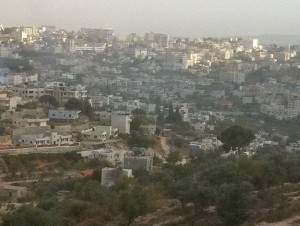Meandering yesterday through the cobblestone streets of Jerusalem’s Old City brought back some poignant memories of my first trip to the Jewish homeland — a precocious and often obnoxious 11-year-old — traveling on a community family mission in 1978.
I most vividly remember the reaction of many Israelis to my yarmulke (skull cap) — specifically the stitching of my first name translated into Hebrew: Yonatan.
They’d flash a proud smile, point to my head, and shout “gibor,” the Hebrew word for hero.
After some initial confusion — I couldn’t figure out why so many Israelis knew about my junior tennis exploits — I learned that I wasn’t the subject of their compliments.
Instead, it was my fellow Yonatan, Jonathan Netanyahu, who two years earlier had led the successful Raid on Entebbe, a hostage rescue mission at the Entebbe Airport in Uganada, in which all 102 hostages were rescued unharmed. Indeed, the only casualty of the mission was Netanyahu himself.
It was a great time to be a Yonatan. And I would never forget the surname.
 A few decades later, I became aware of a new Netanyahu. Yonatan’s baby brother, Benjamin — better known to Israelis as “Bibi” — made a dramatic splash on the international stage in the mid-1980s, as Israel’s representative to the United Nations.
A few decades later, I became aware of a new Netanyahu. Yonatan’s baby brother, Benjamin — better known to Israelis as “Bibi” — made a dramatic splash on the international stage in the mid-1980s, as Israel’s representative to the United Nations.
Of course, I was intrigued. Bibi was smooth, polished, charismatic, and spoke the best American-ized English I’d ever heard from a native Israeli. I was proud to be connected to him; even though the association was mostly in my imagination.
But then came the bad news. Bibi was a card-carrying member of the Likud party, the dreaded right-wing of Israeli politics. A proud, progressive Democrat, I couldn’t associate myself with the Israeli GOP equivalent. And when Bibi’s first foray as Israel’s Prime Minister in the 1990s concluded unsuccessfully — and his personal reputation grew more controversial — my heart hardened further; the Entebbe narrative dissipated further into childhood fantasy.
Over the last couple of years, however, as prospects for peace in the Middle East continued to deteriorate, and as the Palestinian leadership continued to demonstrate a complete unwillingness to compromise, I had begun to reevaluate Netanyahu. And after intensive meetings this week with government officials and university scholars representing all sides of the Israeli political spectrum — including the Palestinians — I have begun to understand how much more complex and nuanced the political dynamic in Israel truly is.
Don’t get me wrong: I haven’t joined the Bibi fan club. I remain particularly critical of his inability to communicate effectively with the international community, particularly my fellow American progressives.
Accordingly, it has made me even more resolute to help clear up some common and troubling misperceptions about Netanyahu and the Israeli government, to help better educate Americans as the Middle East peace process endures.
So here goes…
First, it is critical for Americans to understand that “left” and “right” have entirely different connotations in Israel as they do in the U.S. Indeed, among most of the major parties (with the notable exception of the ultra-Orthodox), there is a national consensus on the hot-button social and economic issues that continue to drive furious wedges among American voters: gay rights, abortion, health care, progressive taxation.
Indeed, the left has won in Israel. The political establishment from left to right already reflects the progressive social and economic values that I hold dear.
The left-right debate in Israel instead is driven principally on two very narrow questions concerning Israel’s precious and fragile security in a scary neighborhood, with adversaries such as a nuke-seeking Iran that publicly embrace Israel’s existential destruction:
- Should Israel return some or all of the land that it captured during the 1967 Six Day War in exchange for peace?
- Should Israel continue to build new settlements within these disputed lands?

We visited the Gilo neighborhood, on the outskirts of Jerusalem. Some have termed this a "settlement," but it lies in the an area that will likely end up in Israel under any compromise
I find myself somewhere in the center.
I believe that Israel should be willing to trade land for peace, but leave itself with defensible borders and reject international demands to unilaterally make territorial concessions without an equivalent commitment from the Arab world.
I also oppose the building of new settlements, but disagree that resolving that issue should be a precondition to negotiations.
As an avid student media consumer — and a fan of the New York Times‘ Thomas Friedman when he writes about the global economy — I had assumed that Bibi’s position was far to the right of mine, and that his obstinence and recalcitrance on land-for-peace and the settlements was a primary stumbling block to Middle East negotiations.
But over the past couple of days, I’ve discovered a few incontrovertible facts that belie the Bibi-as-monster narrative:
- Upon assuming the Prime Minister’s position in 2009, Netanyahu announced his support for a two-state solution: “In my vision of peace,” Bibi stated, “in this small land of ours, two peoples live freely, side-by-side, in amity and mutual respect, each with its own flag and national anthem.” That position endures to today.
- Contrary to Palestinian President Mohammed Abbas’ continued allegations that Israel refuses to negotiate for peace, Bibi has made clear that he strongly supports immediate talks: “Let us meet. Let us speak of peace and let us make peace. I am ready to meet with you anytime. I am willing to go to Damascus, to Riyadh, to Beirut, to any place including Jerusalem.” Indeed, it is Abbas who refuses to meet without preconditions, and who now has tried to bypass negotiations — breaking promises made at the Oslo Accords — by seeking a unilateral United Nations declaration of Palestinian statehood.
- As a gesture to jumpstart negotiations, Bibi declared a ten-month moratorium on the building of settlements in disputed territories. But the Palestinian leadership rejected Netanyahu’s overtures.

The view from Gilo of the little town of Bethlehem, from which terrorist snipers constantly strafed Gilo during the 2000-2003 Intifada
These are extremely complicated matters, so it is critical that interested Americans understand where the parties stand.
And as I’ve written ad nauseum on this site about the demonization of political adversaries, it is essential for all of us to characterize the positions of the key parties fairly, even if we happen to disagree with them.
Stay tuned to these pages for more as my journey to the Holy Land continues…










Leave a Reply